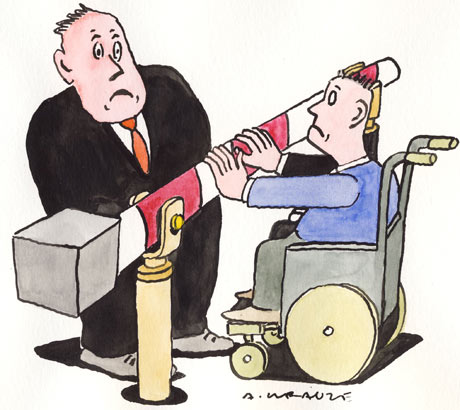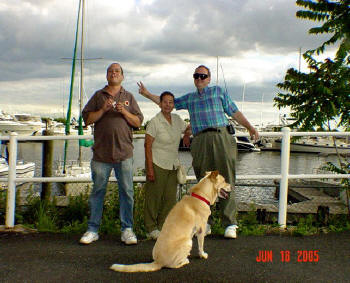Written By: Renegades Foundation
In view of the recent United States Supreme Court Decision that took place on January 11, 2012, we thought it appropriate to discuss this matter. What matter is this? The fact that a most recent decision by the highest Court in the United States, The Supreme Court, decided that it must stay out of Church related job discrimination disputes, in particular to the ministry.
In view of the recent United States Supreme Court Decision that took place on January 11, 2012, we thought it appropriate to discuss this matter. What matter is this? The fact that a most recent decision by the highest Court in the United States, The Supreme Court, decided that it must stay out of Church related job discrimination disputes, in particular to the ministry.

Written By: David Middlebrook
"The purpose of the Americans with Disabilities Act ("ADA") is to prevent discrimination against disabled persons in two basic areas, employment and construction of and access to buildings and transportation. With respect to construction, those provisions of the ADA do not apply to churches. The employment provisions, however, do apply. Therefore, although churches are not required to think about the needs of the general public when undergoing construction (which is not to say that they should not think about the needs of the disabled), they do need to take their current and possibly future employees' needs into consideration. Under the ADA, a church cannot discriminate against a qualified individual with a disability as it applies to any aspect of employment including application procedures, hiring, advancement, discharge, compensation, job training, or other conditions and privileges of employment.
The ADA describes what constitutes "discrimination" and what churches must do to accommodate disabled individuals. Failing to make reasonable accommodations to the known physical or mental limitations of an otherwise qualified applicant or employee with a disability is considered discrimination under the ADA. In addition, the law states that discrimination includes denying employment to a job applicant if the candidate could have worked at the church if reasonable accommodations were made..."
When was the last time you saw a minister perform his or her duties from the platform or pulpit in a wheelchair? Maybe never? Or maybe this person was a special guest and he or she was brought in to present a special message about disability? Even that token gesture would have been better than our churches remaining silent about the issue. Yet the latter is all too often the case. People with disabilities are usually absent from our congregational lives. Churches are usually silent about their absence. Even if people with disabilities are present, they are usually objects of our ministry, not ministers to and with us.
A few evangelical churches may have congregants in wheelchairs or with disabilities. But their leaders, staff, and (certainly) pastors all are able-bodied. Evangelicals may say that all people are equal in the eyes of God. Yet some people – who are not disabled – seem to be more equal than others as far as ministerial leadership is concerned. After all, we often instinctively associate disability with sin and curses, as a sign of living in a fallen world. We get this from a surface reading of the Bible, as, for example, when the Deuteronomist links disabling conditions like blindness to Israel’s disobedience (Deut. 28). But what if these views are actuallymisinterpretations shaped by a long history of social and cultural prejudices? What if such ideas reflect a subtle ableism that in fact discriminates against people with disabilities?
Written By: Jessie Holland
In a groundbreaking case, the Supreme Court on Wednesday held for the first time that religious employees of a church cannot sue for employment discrimination.
But the court's unanimous decision in a case from Michigan did not specify the distinction between a secular employee, who can take advantage of the government's protection from discrimination and retaliation, and a religious employee, who can't.
It was, nevertheless, the first time the high court has acknowledged the existence of a "ministerial exception" to anti-discrimination laws -- a doctrine developed in lower court rulings. This doctrine says the First amendment's guarantee of freedom of religion shields churches and their operations from the reach of such protective laws when the issue involves employees of these institutions.
The case came before the court because the Federal Equal Employment Opportunity Commission sued the Hosanna-Tabor Evangelical Lutheran Church and School of Redford, Mich., on behalf of employee Cheryl Perich, over her firing, which happened after she complained of discrimination under the Americans With Disabilities Act...


.jpg)





